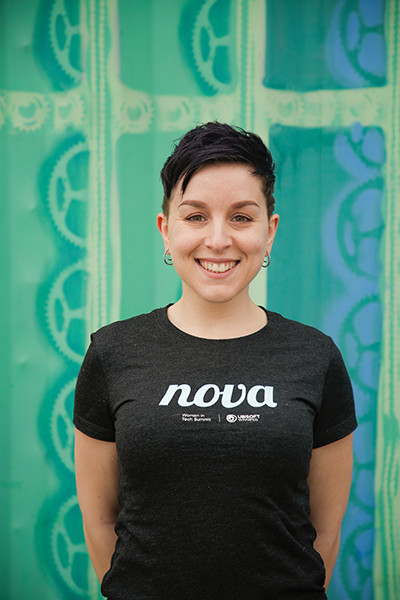Identifying the roots of gender disparity in STEM
Debriefing the Nova Summit

Meagan Nenka, who has researched gender gaps in STEM, moderated a panel at the Nova: Ubisoft Winnipeg Women in Tech Summit.
It’s pretty widely known that there are gender disparities in STEM fields, and earlier this year, the University of Winnipeg (U of W) and Ubisoft collaborated to explore why.
On Feb. 11, the U of W and Ubisoft Winnipeg held the Nova: Ubisoft Winnipeg Women in Tech Summit, a conference examining how to foster interest in STEM subjects for girls and women at various ages.
Dr. Sheri-Lynn Skwarchuk, a professor of education and director of developmental studies at the U of W who was part of the conference development team, says Nova began when Ubisoft Winnipeg approached her and Dr. Ken Reimer with concerns about gender disparities in STEM, specifically the gaming sector.
“It was a unique opportunity to look at the way industry approaches the question versus the way academia approaches the question,” Skwarchuk says.
Meagan Nenka, who researched gender gaps in STEM with Reimer in 2019, moderated a panel in the early childhood programming track of the conference and says there were some fruitful discussions on the panels.
“We were discussing how to really foster that organic love for math and science that exists in girls, but also to challenge the way that we may be unintentionally directing boys into these careers and unintentionally but implicitly dissuading girls from pursuing these paths,” she says. Nenka notes she would have also liked to see more discussion of where people outside the gender binary fit into the subject.
“Growing up in this world, I was really curious about the sciences, but there are just these subtle ways that we sometimes question our ability to excel in these paths,” she says. Nenka, who currently works in a middle school, says she thinks about this while working and tries to encourage her students to not have those uncertainties.
The conference, which Skwarchuk says had been in development for over a year, was delayed due to the COVID-19 pandemic but eventually held virtually.
“I’ve read literature about the gaming industry, and where we actually see the problem is not at the university level, in terms of how many women enter the sciences, but where it drops off is once people graduate. People aren’t taking those career jumps into the tech field,” Skwarchuk says. She notes research suggests women are driven for social interactions and collaboration in workplaces, and tech jobs may not offer those opportunities.
“You almost have to break the culture behind the industry and what it offers,” she says. “We have to keep encouraging girls to work with science and math, but we also need to provide opportunities for careers for women.”
Ubisoft did not respond to requests for comment. Nova comes less than a year after many Ubisoft employees came forward with allegations of sexual misconduct and mishandling of claims of misconduct at the company. An employee survey found that one in four employees had witnessed or experienced workplace misconduct in the past two years, and one in five did not feel “fully respected or safe in the work environment.”
Skwarchuk says Ubisoft added the ToyBox project she is working on as part of their Passion Projects mentorship program.
Published in Volume 75, Number 20 of The Uniter (March 4, 2021)







